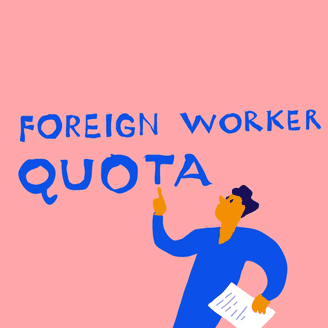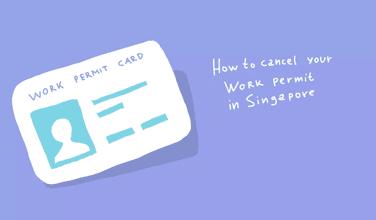- Osome Blog SG
- Understanding Singapore’s Foreign Worker Quota
Understanding Singapore’s Foreign Worker Quota and How It Works
- Modified: 6 August 2024
- 7 min read
- Foreigner's Guide


Jon Mills
Business Writer
Jon gets his kicks writing content that educates and entertains. He has a background in copy and content writing for brands and has been lucky to share unique stories, adding value to luxury products. Now, he brings the journeys and advice of our in-house accounting experts and small business owners to life for Osome's readers. He wants to help entrepreneurs set their sights high and build flourishing, reputable businesses.
If you're a foreign worker in Singapore, the chances are that you've encountered or heard about the foreign worker quota. It's something that employers in Singapore have to adhere to when hiring foreign labour.
In this article, we'll explore what the foreign worker quota is and how it works. We'll also delve into the eligibility requirements for foreign workers and the criteria used to determine their skills levels.
What Is a Foreign Worker Quota?
The foreign worker quota in Singapore is a limit on the number of foreign workers that a company can hire based on the company's industry and size. The government implemented the quota for hiring foreign workers in Singapore to control the influx of foreign workers into the country and ensure that Singapore's citizens have access to employment opportunities. The quota also varies depending on the sector of the economy. For example, the construction industry has a higher quota of foreign workers compared to the service industry.
The quota for hiring foreign workers in Singapore has been in place for several years and has undergone several changes to meet the needs of the country. The government reviews the quota system regularly to ensure that it is effective and efficient. The quota system is not only limited to the number of foreign workers that a company can hire, but it also includes levies and other measures to regulate the employment of foreign workers.
The construction industry is one of the sectors that rely heavily on foreign workers. The quota system allows for a higher number of foreign workers in this industry due to the nature of the work. Construction work is labour-intensive and requires a large workforce. The quota system makes sure that the construction industry has access to the necessary workforce while also regulating the number of foreign workers in the country.
The service industry, on the other hand, has a lower quota of foreign workers in Singapore. The service industry includes sectors such as retail, hospitality, and food and beverage. The service industry is a significant contributor to Singapore's economy, and the government has to strike a balance between the needs of the industry and the employment opportunities for Singaporeans.
Thinking about starting a business in Singapore? It’s a great move, and getting an Employment Pass can help you work here legally. Whether you’re launching a new venture or joining an existing one, we can guide you through the process. Reach out to find out more about setting up your business and obtaining an Employment Pass!
Foreign Worker Quota and Levy in Singapore
The Singaporean government has always been keen to ensure that the local workforce is not displaced by foreign workers. The quota is a proportionate limit on the number of foreign workers a company can hire based on the company's size and industry. This means that companies have to ensure that they stay within the quota set by the government. The quota is reviewed periodically to ensure that it is in line with the country's economic needs.
Companies also have to pay a levy to employ foreign labour. The levy is an additional cost that companies have to bear when they hire foreign workers. The levy is calculated based on the number of local employees versus the number of foreign employees in the company. The rationale behind this policy is to encourage companies to hire more local workers and reduce their reliance on foreign workers.
It is important to note that the quota and levy policies apply to all industries in Singapore. However, some industries are more heavily regulated than others.
Despite the quota and levy policies, Singapore remains an attractive destination for foreign workers. This is due to the country's stable political environment, excellent infrastructure, and high standard of living. Many foreign workers come to Singapore to seek better job opportunities and a higher quality of life.
Foreign Worker Quota and Levy for F&B Businesses
Food and beverage (F&B) businesses are an integral part of Singapore's economy, contributing to the country's vibrant and diverse food culture. However, the industry faces a lower foreign worker quota and higher levy rates compared with other industries. This is because the government is keen to ensure that Singaporeans are given priority in employment opportunities, especially during these uncertain times.
Despite the challenges that F&B businesses face, many entrepreneurs have managed to succeed by leveraging on Singapore's reputation as a food paradise. With the right mix of creativity, innovation, and hard work, F&B businesses can thrive in Singapore's competitive market.
Currently, F&B businesses have a quota of 45% foreign workers and have to pay a higher levy compared to other sectors. This means that F&B businesses have to be strategic in their hiring process and ensure that they are able to attract and retain the best talent. This is especially important as the industry is constantly evolving, with new trends and tastes emerging all the time.
However, the Singaporean government offers a few F&B-centric schemes for the industry's growth. For example, the Productivity Solutions Grant (PSG) helps F&B businesses to adopt technology and equipment that can improve their operations and productivity. This can include things like automated kitchen equipment, point-of-sale systems, and inventory management software.
Another scheme that F&B businesses can tap into is the Capability Development Grant (CDG), which provides funding support for businesses to upgrade their capabilities in areas like marketing, branding, and human resource management. This can help F&B businesses to stand out in a crowded market and attract more customers.
F&B businesses can also benefit from the government's efforts to promote Singapore as a food destination. The Singapore Tourism Board (STB) has been actively promoting Singapore's food culture through various initiatives, such as the annual Singapore Food Festival and the Michelin Guide Singapore. These efforts have helped to put Singapore on the map as a foodie's paradise, attracting both locals and tourists alike.
If you need to cancel a work permit in Singapore, take a look at this article on work permit cancellation to learn how.
Foreign Worker Quota and Levy for Self-employed
Are you a self-employed individual in Singapore who is looking to grow your business by hiring foreign labour? If so, it is important to understand the foreign worker quota and levy rates that apply to you.
Unlike companies, self-employed individuals are only allowed to employ one foreign worker. This means that you need to choose your foreign employee carefully, ensuring that they have the necessary skills and experience to help you grow your business.
However, the good news is that the foreign worker quota for self-employed individuals is set at a more relaxed 20%. This means that you have more flexibility in hiring foreign labour to support your business.
It is important to note that self-employed individuals are also required to pay a monthly levy to employ foreign workers. The levy rates vary depending on the sector that your business operates in, as well as the number of foreign workers that you employ.
Example
For example, if you are a self-employed individual operating in the construction sector and you have one foreign worker, you will be required to pay a monthly levy of $300. However, if you have more than one foreign worker, the levy rates will increase accordingly.
It is important to factor in the cost of the levy when deciding whether to hire foreign labour. However, many self-employed individuals find that the benefits of hiring foreign workers, such as their expertise and experience, far outweigh the costs.
How Does the Foreign Worker Quota Work?
The quota system works by calculating the number of Singaporean citizens and permanent residents (PRs) that a company employs vs the number of foreign workers they hire. The proportion of foreign workers to the total company workforce should be at most the quota limit imposed on the industry.
How Is the Foreign Worker Quota Calculated?
The Ministry of Manpower (MOM) calculates the quota limit for each industry based on the proportion of foreign and local employees in the respective sectors. The MOM also reviews the quota system regularly and adjusts the limits if necessary to maintain a balance between local and foreign labour.
Sector/Pass type | Tier | Dependency Ratio Ceiling (DRC) | Levy Rates ($) (Higher-skilled R1/Basic-skilled R2) |
|---|---|---|---|
| Services (Work Permit holders) | Basic Tier | 35% | $300 / $600 |
| Services (Work Permit holders) | Tier 2 | Above 35% up to 38% | $400 / $700 |
| Services (S Pass holders) | NA | 13% | $330 |
| Manufacturing (Work Permit holders) | NA | 60% | $250 / $450 |
| Manufacturing (S Pass holders) | NA | 20% | $330 |
| Construction (Work Permit holders, basic skilled) | Basic Tier | Up to 87.5% | $300 / $600 |
| Construction (Work Permit holders, basic skilled) | Tier 2 | Above 87.5% | $400 / $700 |
| Construction (Work Permit holders, higher skilled) | Basic Tier | Up to 87.5% | $300 |
| Construction (Work Permit holders, higher skilled) | Tier 2 | Above 87.5% | $600 |
| Construction (S Pass holders) | NA | 18% | $330 |
| Process (Work Permit holders) | NA | 87.5% | $300 / $450 |
| Process (S Pass holders) | NA | 18% | $330 |
| Marine Shipyard (Work Permit holders) | NA | 77.8% | $300 / $450 |
| Marine Shipyard (S Pass holders) | NA | 18% | $330 |
Foreign Worker Eligibility
There are certain criteria and skill levels that need to be considered if you’re to be eligible to be employed as a foreign worker in Singapore.
Qualifying Criteria
The MOM sets specific eligibility criteria for foreigners seeking employment in Singapore. These criteria include a minimum age requirement, educational/professional qualification, work experience, and a clean record with no criminal convictions. It's essential to note that each sector has different criteria for eligibility.
Don’t forget about keeping everything up to date — which might mean a work permit renewal from time to time.
Skill Levels
The MOM also categorises foreign workers based on their skill levels. They're classified as either skilled, semi-skilled, or unskilled labour. Skilled labour requires tertiary education or equivalent experience, while semi-skilled labour only requires primary or secondary education. Unskilled labour needs no education and minimal work experience.
Hire the experts! Osome knows how important it is to have the right people for the job. Which is why we’ve teamed up expert accountants with simple software — so your business can truly shine.
A More Balanced Workforce
The foreign worker quota is an essential policy measure that Singapore's government implements to maintain the balance between local and foreign labour. It's crucial for employers and employees to be aware of the quota limits and eligibility criteria when engaging in any employment arrangement. By adhering to these policies, we can create a more harmonious and sustainable work environment for everyone involved.






